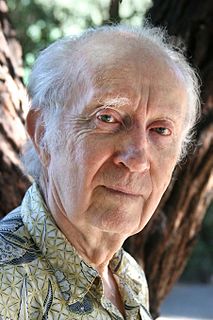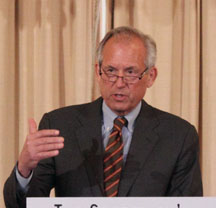A Quote by Octavio Paz
Despite the often illusory nature of essays on the psychology of a nation, it seems to me there is something revealing in the insistence with which a people will question itself during certain periods of its growth.
Related Quotes
Some periods of our growth are so confusing that we don't even recognize that growth is happening...Those long periods when something inside ourselves seems to be waiting, holding its breath, unsure about what the next step should be, eventually become the periods we wait for, for it is in those periods that we realize that we are being prepared for the next phase of our life and that, in all probability, a new level of the personality is about to be revealed.
He's one of those smart, drifty young people who, after certain deliberations, decides he wants to do Something in the Arts but won't, possibly can't, think in terms of an actual job; who seems to imagine that youth and brains and willingness will simply summon an occupation, the precise and perfect nature of which will reveal itself in its own time.
All human affairs follow nature's great analogue, the growth of vegetation. There are three periods of growth in every plant. The first, and slowest, is the invisible growth by the root; the second and much accelerated is the visible growth by the stem; but when root and stem have gathered their forces, there comes the third period, in which the plant quickly flashes into blossom and rushes into fruit.
The growth of art seems to be in cycles, and often its vigorous lifetime is restricted to a century or two. The periods of distinctive drama, Greek, English, Spanish, fall within such a limit; the schools of painting and sculpture likewise; and, in poetry, the Victorian age or the school of Pope will serve as examples.
Some people think that evolutionary psychology claims to have discovered that human nature is selfish and wicked. But they are flattering the researchers and anyone who would claim to have discovered the opposite. No one needs a scientist to measure whether humans are prone to knavery. The question has been answered in the history books, the newspapers, the ethnographic record, and the letters to Ann Landers. But people treat it like an open question, as if someday science might discover that it's all a bad dream and we will wake up to find that it is human nature to love one another.
What happens to the mind of a person, and the moral fabric of a nation, that accepts the aborting of the life of a baby without a pang of conscience? What kind of a person and what kind of a society will we have twenty years hence if life can be taken so casually? It is that question, the question of our attitude, our value system, and our mind-set with regard to the nature and worth of life itself that is the central question confronting mankind. Failure to answer that question affirmatively may leave us with a hell right here on earth.
Because of my experience in Occupy, instead of asking the question, "Who will benefit from this system I'm implementing with the data?" I started to ask the question, "What will happen to the most vulnerable?" Or "Who is going to lose under this system? How will this affect the worst-off person?" Which is a very different question from "How does this improve certain people's lives?"
Criticism of growth arose with the discovery that growth beyond a certain point is destructive of the earth. We are already using resources much faster than they can be replenished. We are producing wastes much faster than nature's sinks can process them. The growth economy will end. The only questions are when its end will come, and whether humanity will be able to survive its demise.
We fell in love during the making of 'Ye Maaya Chesave' in 2009, and the love affair continued very well in the following years. I was, however, delaying revealing to my parents about my love affair despite Sam's insistence. One day, when we were chatting casually, Sam threatened to tie a 'rakhi' on me if I didn't tell about the love to my parents.
Because everybody who has ever lost their way in life has felt the nagging insistence of that question. At some point we all look up and realize we are lost in a maze, and I dont want us to forget Alaska, and I don't want to forget that even when the material we study seems boring, we're trying to und3erstand how people answered that question and the question each of you posed in your papers--how different traditions have come to terms with what Chip, in his final, called 'people's rotten lots in life.







































